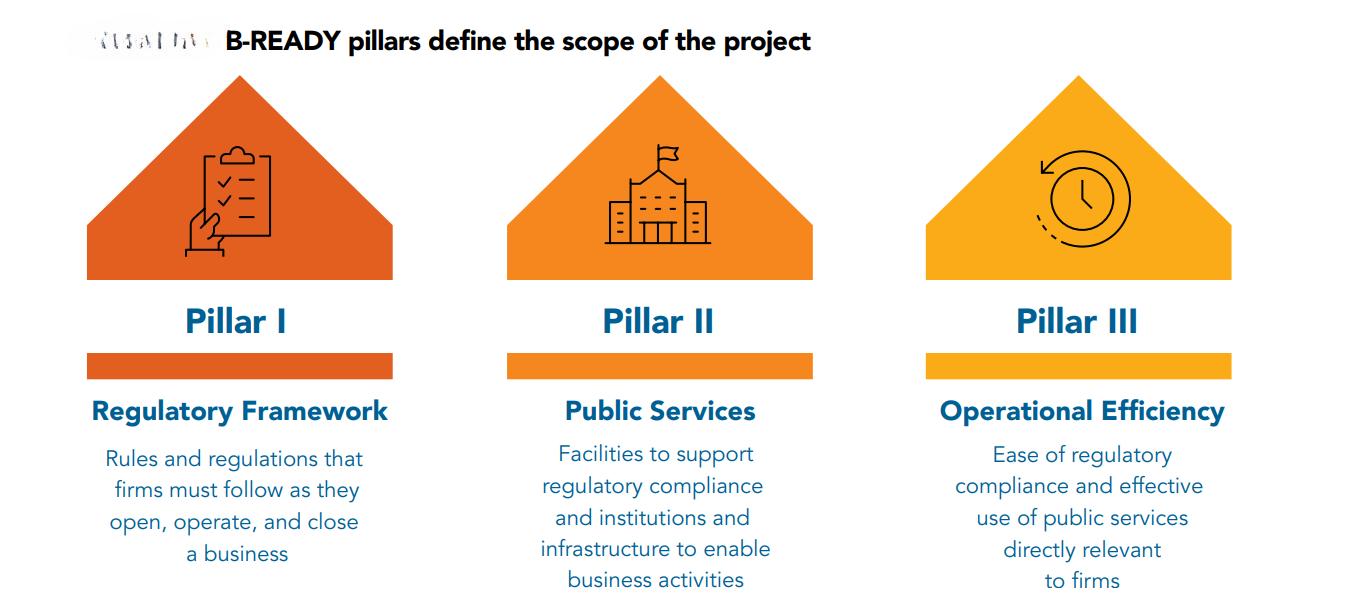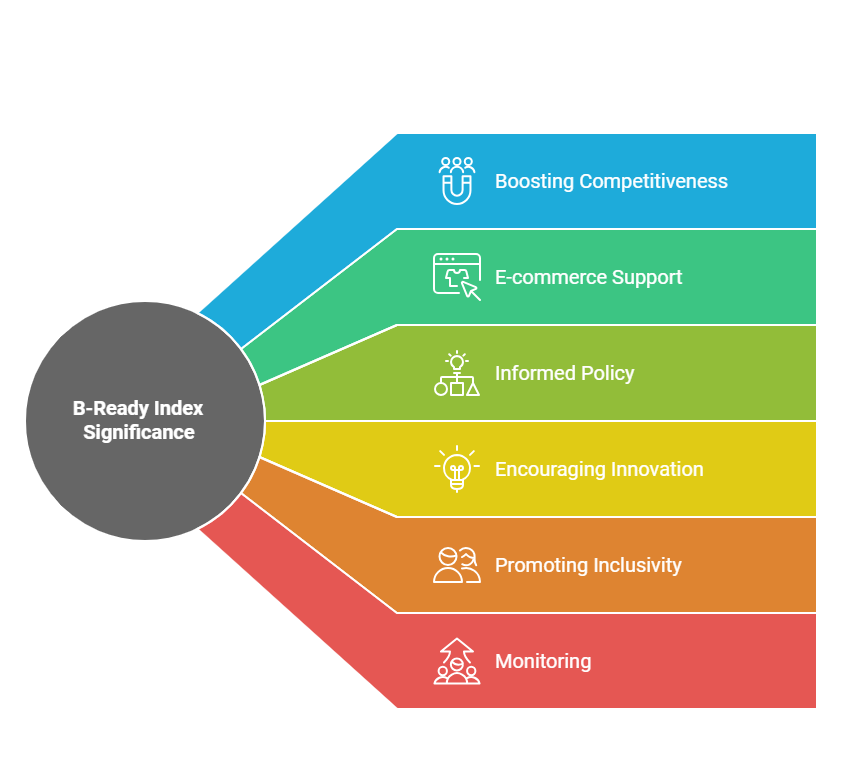Economy
Business Ready (B-READY) Report 2024
- 01 Jan 2025
- 10 min read
Why in News?
Recently, the World Bank launched the Business Ready (B-READY) report 2024 to replace the Ease of Doing Business report.
- The Ease of Doing Business report was paused in 2020 due to data manipulation issues and concerns over the integrity of certain rankings, leading to an independent review and methodology changes.
What is Meant by Business Ready?
- Benchmarking Tool: B-READY evaluates the global business climate to promote inclusive private sector growth.
- Ten Core Topics: B-READY is organized around key topics for private sector development, covering the stages of a firm's life cycle, including market entry, operation (or expansion), and closure (or reorganization).
- Ten Core topics covers Business Entry, Business Location, Utility Services, Labor, Financial Services, International Trade, Taxation, Dispute Resolution, Market Competition, and Business Insolvency.
- Pillars of B-READY: For each topic, B-READY considers three pillars.
- Pillar I: Regulatory Framework – Focuses on the rules and regulations firms must follow during their life cycle, highlighting those that support clarity, fairness, and business sustainability, and those that hinder entrepreneurship.
- Pillar II: Public Services – Covers government-provided services and infrastructure that support regulatory compliance and business activities, with an emphasis on digitalization, interoperability, and transparency.
- Pillar III: Operational Efficiency – Measures how easily firms can comply with regulations and utilize public services relevant to their operations.
- Indicators: B-READY analyzes 1,200 indicators to identify policy reform opportunities, using data from primary sources to highlight key aspects of each topic.
- Three Themes: B-READY assesses three key themes across 10 topics.
- Digital Adoption: Evaluates digital integration by governments and businesses in the business environment.
- Environmental Sustainability: Analyzes regulatory provisions affecting business operations with a focus on sustainability.
- Gender: Examines the collection of gender-disaggregated data and the implementation of gender-sensitive regulations and programs.
- Scoring: B-READY generates two sets of scores for each economy.
- Topic Scores: Averaged from scores across the three pillars, based on indicators that reflect firm flexibility and social benefits.
- Pillar Scores: Averaged from scores across 10 topics, standardised to range from 0 to 100.
- Data Collection: B-READY collects data through expert questionnaires for regulatory and public service aspects, and through World Bank Enterprise Surveys for operational efficiency, with updates to expert data annually and firm-level data every three years.
- Global Expansion: Covers 50 economies in 2024, with plans to reach 180 by 2026.
- Focus on Reform: B-READY shifts focus to inclusivity, sustainability, and efficiency in evaluating business environments.
Comparison of Ease of Doing Business and the B-READY Index
|
Aspect |
Ease of Doing Business (EoDB) |
B-READY Index |
|
Objective |
Focused on evaluating the regulatory environment for SMEs. |
Holistic evaluation of private sector development, including SMEs, workers, and consumers. |
|
Scope |
Primarily regulatory burden. |
Covers regulatory burden, quality of regulations, and public services. |
|
Topics Covered |
Limited to a few key topics like starting a business, getting credit, and paying taxes. |
Comprehensive: Covers 10 topics spanning a firm’s lifecycle, including business entry, utility services, labor, and market competition. |
|
Framework |
Focused mainly on ease of doing business for firms. |
Includes firm flexibility (ease of business) and social benefits (impact on society). |
|
Data Collection |
Relied on expert consultations and case studies. |
Combines expert consultations and firm-level surveys for a balanced de jure and de facto perspective. |
|
Indicators |
Used around 11 questionnaires covering a limited number of indicators. |
Uses 21 questionnaires and nearly 1,200 indicators for detailed insights. |
|
Scoring and Ranking |
Produced aggregate rankings and scores, often criticized for oversimplification. |
Provides disaggregated scores by topic and pillar, encouraging targeted reforms rather than overall rankings. |
|
Geographic Coverage |
Covered the main business city in 191 economies. |
Plans to expand to 180 economies by 2026, with a focus on national and local regulations. |
|
Public Services |
Limited attention to public services. |
Explicitly evaluates public services and their operational efficiency. |
|
Cross-Cutting Themes |
Did not include specific themes. |
Focuses on digital adoption, environmental sustainability, and gender equality. |
|
Use of Results |
Primarily for regulatory benchmarking and reform motivation. |
Provides actionable insights for reforms, transparency, and data reproducibility. |
|
Methodology Updates |
Static methodology with minor updates over time. |
Dynamic methodology that evolves based on feedback and lessons from rollouts. |
What are the Global Findings of B-READY Report 2024?
- Public Services Gap: Economies often enact strong regulations but falter in providing the public services needed for their effective implementation, creating a significant “public services gap.”
- Inclusivity Across Income Levels: High-performing economies like Rwanda, Georgia, and Colombia prove that robust regulatory frameworks and operational efficiency are achievable across income levels.
- Digital and Environmental Practices: Economies that integrate digital tools and prioritize green initiatives achieve higher scores, reflecting the importance of modern practices.
- Balanced Development Needed: Even high-income economies like Estonia and Singapore show scope for improvement in areas like taxation and dispute resolution, emphasizing the universal need for reforms.
India Specific Observations of think tank Global Trade Research Initiative (GTRI)
- India did not participate in the 2024 B-READY Report. However, there are some India-specific observations by the think tank GTRI.
- Moderate Score in Business Entry: India’s business registration system is time-consuming and lacks complete digital integration.
- Countries like Singapore achieve one-day online registration with minimal costs, setting a global benchmark.
- Challenges in Labor Regulations: Despite introducing four labor codes, India faces slow and uneven implementation across states, affecting labor market flexibility and compliance ease.
- Trade Inefficiencies: India’s customs processes are marred by delays, inconsistent enforcement, and high logistics costs, unlike Germany and Singapore, which excel in trade facilitation.
- Low Score in Business Location: Regulatory inconsistencies and approval delays hinder the establishment of business facilities, affecting investment decisions.
- Positive Aspects: India is expected to perform well in the three core pillars of B-READY, highlighting strengths in operational and regulatory areas.
- Moderate Score in Business Entry: India’s business registration system is time-consuming and lacks complete digital integration.
What are the Recommendations in the Business Ready (B-READY) Report 2024?
- Streamline Business Operations: Simplify and digitize business registration, regulatory approvals, and customs processes to reduce delays, lower costs, and enhance efficiency, inspired by models like Singapore’s single-day registration system.
- Strengthen Public Services and Digital Transformation: Invest in key public services such as tax portals, utility access, and dispute resolution mechanisms while promoting digital tools to improve compliance and operational efficiency.
- Promote Sustainability and Inclusivity: Develop policies that encourage environmentally sustainable business practices and enforce gender-sensitive regulations to foster inclusivity and align with global climate goals.
- Facilitate Peer Learning and Collaboration: Encourage economies to share knowledge and learn from best-performing countries like Singapore, Rwanda, and Estonia to adopt innovative practices in regulatory and operational frameworks.
- Adopt Tailored Reforms: Design customized policy frameworks that address unique local challenges while adhering to global standards for inclusive and balanced economic growth.
|
Drishti Mains Question What is the significance of the Business Ready (B-READY) report 2024, and how does it differ from the previous Ease of Doing Business report in assessing the global business climate? |
UPSC Civil Services Examination, Previous Year Questions (PYQs)
Prelims:
Q. India’s ranking in the ‘Ease of Doing Business Index’ is sometimes seen in the news. Which of the following has declared that ranking? (2016)
(a) Organization for Economic Cooperation and Development (OECD)
(b) World Economic Forum
(c) World Bank
(d) World Trade Organization (WTO)
Ans: (c)







